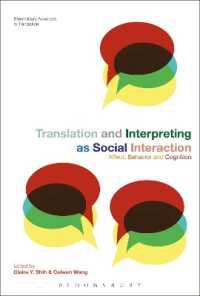- ホーム
- > 洋書
- > 英文書
- > Psychology
Full Description
This groundbreaking book offers a comprehensive examination of personality disorders, from conceptual and theoretical concerns to the practical problems faced by assessing clinicians.
What are personality disorders? How should they be conceptualized, and how should they be assessed and diagnosed in clinical practice? For over a century these questions have been at the heart of psychological science. Yet even today, as the recent controversy over proposed changes to the classification of personality disorders in DSM-5 attests, there is hardly consensus on the answers.
Personality Disorders offers a comprehensive and provocative tour of a field that is ripe for integration. Contributors who rank among the world amp rsquo s most prestigious clinical and personality psychologists guide readers through the state of our knowledge of personality disorders, from conceptual and theoretical concerns to the practical problems faced by assessing clinicians. They address the advantages and disadvantages of categorical and dimensional approaches to diagnosing personality pathology used in the standard diagnostic manuals, as well as the amp ldquo hybrid amp rdquo model described in Section III of DSM-5. Recent advances in statistical, methodological, and biogenetic research strategies are applied to the study of personality disorders, with a focus on clinical and empirical approaches to assessment and diagnosis. Theorists describe how psychodynamic, attachment, interpersonal, evolutionary, and cognitive processing approaches offer surprisingly similar models of conceptualizing and treating personality disorders.
Contents
Contributors
Introduction: Personality Disorders Into the 2 st Century
Steven K. Huprich
I. Current Issues in the Diagnosis and Assessment of Personality Disorders
The Value of Retaining Personality Disorder Diagnoses
Kenneth R. Silk
A Critical Evaluation of Retaining Personality Categories and Types
Douglas B. Samuel and Sarah A. Griffin
The Role of Traits in Describing, Assessing, and Understanding Personality Pathology
Kristian E. Markon and Katherine G. Jonas
A Critical Evaluation of Moving Toward a Trait System for Personality Disorder Assessment
Kevin B. Meehan and John F. Clarkin
II. Research and Assessment Strategies
At the Nexus of Science and Practice: Answering Basic Clinical Questions in Personality Disorder Assessment and Diagnosis With Quantitative Modeling Techniques
Aidan G. C. Wright and Johannes Zimmermann
Lessons Learned From Longitudinal Studies of Personality Disorders
Alex S. Keuroghlian and Mary C. Zanarini
Biological Bases of Personality Disorders
Susan C. South
Object Relations Theories and Personality Disorders: Internal Representations and Defense Mechanisms
Caleb Siefert and Jonathan H. Porcerelli
Integrating Clinical and Empirical Perspectives on Personality: The Shedler amp ndash Westen Assessment Procedure (SWAP)
Jonathan Shedler
Assessing Explicit and Implicit Processes in Personality Pathology
Irving B. Weiner
Process-Focused Assessment of Personality Pathology
Robert F. Bornstein
III. Moving Toward Integrated and Unified Models of Personality Disorders and Pathology
An Integrative, Psychodynamic Framework of Personality Pathology
Patrick Luyten and Sidney J. Blatt
An Integrative Attachment Theory Framework of Personality Disorders
Kenneth N. Levy, J. Wesley Scala, Christina M. Temes, and Tracy L. Clouthier
An Integrative Interpersonal Framework for Understanding Personality Pathology
Nicole M. Cain and Emily B. Ansell
An Integrating and Comprehensive Model of Personality Pathology Based on Evolutionary Theory
Theodore Millon and Stephen Strack
The Cognitive amp ndash Affective Processing System Model of Personality Pathology: Ready-Made for Theoretical Integration
Steven K. Huprich and Sharon M. Nelson
The Link Between Personality Theory and Psychological Treatment: A Shifting Terrain
John F. Clarkin, Nicole M. Cain, and W. John Livesley
Index
About the Editor








